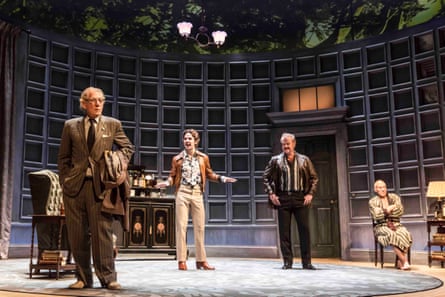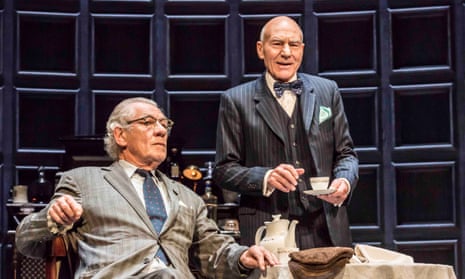When Ian McKellen and Patrick Stewart joined forces in Waiting For Godot in 2009, I felt they sentimentalised Beckett’s play by lending it a cosy charm. Now they are together again in Harold Pinter’s 1975 work – under the same director, Sean Mathias – and the result is a faithful and loving production that captures both the essential bleakness and paradoxical comedy of this enigmatic masterwork.
The beauty of Pinter’s play is that it is open to many interpretations. On the surface, it looks simple enough. Spooner, a minor versifier and pub potman, is invited back into the luxurious Hampstead pad of a famous writer, Hirst. But, while the wheedling Spooner seeks to ingratiate himself with his heavy-drinking host, he finds himself blocked by Hirst’s intimidating manservants, Briggs and Foster. Gradually the tone shifts as Spooner seeks to reignite Hirst’s creative imagination and stir his memories. The attempt fails as Hirst seems trapped forever in an unyielding no man’s land which serves as an anteroom to death.
My first reaction, on seeing the play in 1975, was that it represented a projection of Pinter’s darkest fears. Hirst, wealthy, immured and cut off from the source of his original inspiration, struck me as Pinter’s nightmare vision of the isolation of fame. Spooner, scraping a meagre living as a minor poet and odd-job man, was a recollection of his own impoverished past. But, while I still think there is something in that, the play thrives on its tonal contrasts. Behind it lies a constant tension between death and life, resignation and resistance, fixity and flux, even town and country. All that is nicely caught in Stephen Brimson Lewis’s design in which the luxurious prison of Hirst’s Hampstead home is seen in the context of swaying trees which gradually take on an icy coloration as the play reaches its terminal stages.

This is not only the most poetic of Pinter’s plays, it is also one that offers great opportunities for actors which Stewart and McKellen richly seize. It is well-known that the names of Hirst and Spooner derive, respectively, from famous Yorkshire and Lancashire cricketers. Stewart and McKellen also hail from opposite sides of the Pennines which makes for an intriguing vocal blend. But they also play off each other beautifully. In the opening scene McKellen, with a jaunty corduroy cap from which the label uneasily protrudes, perfectly captures Spooner’s chattering anxiety and desperate desire to please. Stewart, meanwhile, exudes an infinite weariness as he drinks himself into oblivion, occasionally arching an astonished eyebrow, as when Spooner recalls the beauty of his mother’s buns. The contrast is comic but becomes something more when McKellen whips out a notebook and pencil to cold-heartedly observe his host’s humiliating, drunken exit on all fours.
This may, ultimately, be a play about stasis but within it there is dynamic movement. You see that in the brilliant morning-after-the-night-before scene when a recovered Hirst bounds into the room and greets Spooner as if he were a long-lost friend. This contains some of Pinter’s most virtuosic writing and shows the two actors at their best. Stewart radiates ebullient smugness as he claims to have seduced Spooner’s wife. At first McKellen reacts with slack-jawed dismay but, slowly realising this is some clubman’s fantasy, picks up on the rules of the game. When he reveals he was enthusiastically fellated by one of Hirst’s closest female friends, a smile of triumph spreads across McKellen’s seamed features as he crosses his legs in satisfaction.
Behind the comedy, however, there is always an edge of danger which you see in the figures of Briggs and Foster. Mathias doesn’t go quite as far as Rupert Goold’s 2008 production in suggesting the two men are sadomasochistic partners but implies there is a homoerotic connection between them. Owen Teale’s Briggs, with his villain’s moustache and visible tattoos, has an air of menacing thuggery which turns to tenderness when he seeks to promote the poetic career of Damien Molony’s boyishly sexy Foster. The relationship is delicately defined and when Stewart’s Hirst caresses Foster’s face you even wonder if Spooner has inadvertently stumbled into a closeted menage.
But it is the twilit adagio of the play’s end that always moves me most. My interpretation is that Spooner has turned from a cadging parasite into Hirst’s potential rescuer but is thwarted by the immovable fact of mortality. But it is up to every spectator to make up their own mind. What is unassailable is that four excellent actors, under Mathias’s direction, exquisitely capture the fluctuations of mood of this remarkable play. Pinter’s No Man’s Land is both desolate and funny and conveys, without peddling any message, the never-ending contrast between the exuberance of memory and the imminence of extinction.
- At Wyndham’s, London, until 17 December. Box office: 0844 482 5120










Comments (…)
Sign in or create your Guardian account to join the discussion